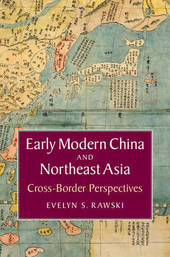
|
Early Modern China and Northeast Asia: Cross-Border Perspectives
Paperback / softback
Main Details
| Title |
Early Modern China and Northeast Asia: Cross-Border Perspectives
|
| Authors and Contributors |
By (author) Evelyn S. Rawski
|
| Series | Asian Connections |
|---|
| Physical Properties |
| Format:Paperback / softback | | Pages:349 | | Dimensions(mm): Height 228,Width 152 |
|
| Category/Genre | Asian and Middle Eastern history |
|---|
| ISBN/Barcode |
9781107471528
|
| Classifications | Dewey:951.026 |
|---|
| Audience | | Professional & Vocational | |
|---|
|
Publishing Details |
| Publisher |
Cambridge University Press
|
| Imprint |
Cambridge University Press
|
| Publication Date |
5 June 2015 |
| Publication Country |
United Kingdom
|
Description
In this revisionist history of early modern China, Evelyn Rawski challenges the notion of Chinese history as a linear narrative of dynasties dominated by the Central Plains and Hans Chinese culture from a unique, peripheral perspective. Rawski argues that China has been shaped by its relations with Japan, Korea, the Jurchen/Manchu and Mongol States, and must therefore be viewed both within the context of a regional framework, and as part of a global maritime network of trade. Drawing on a rich variety of Japanese, Korean, Manchu and Chinese archival sources, Rawski analyses the conflicts and regime changes that accompanied the region's integration into the world economy during the sixteenth and seventeenth centuries. Early Modern China and Northeast Asia places Sino-Korean and Sino-Japanese relations within the context of northeast Asian geopolitics, surveying complex relations which continue to this day.
Author Biography
Evelyn S. Rawski is Distinguished University Professor of History at the University of Pittsburgh. She received a PhD in History and Far Eastern Languages from Harvard University, Massachusetts in 1968. A Guggenheim Fellow in 1990, she served as president of the Association for Asian Studies from 1995-6. She is the author of Agricultural Change and the Peasant Economy of South China (1972), Education and Popular Literacy in Ch'ing China (1979), and The Last Emperors: A Social History of Qing Imperial Institutions (1998).
Reviews'[Rawski] challenges the China-centered, uni-national approach with this exploration of how the states and cultures across Northeast Asia influenced China's history, culture, and identity in the early modern era. The author's earlier works on Qing China make her eminently suited to write this book. Rawski does not limit herself to the late imperial period, however, as she applies her analysis to contemporary China and, especially, its fraught relations with Japan and Korea. ... Rawski's deployment of Chinese, Japanese, and Korean primary sources underlines her approach and should further the book's utility to readers interested in any or all of the three culture areas. ... A unique work in its scope, sources, and argument. ... Highly recommended.' M. C. Brose, Choice 'Rawski's book is a significant achievement. Her comparative approach is likely to prove informative for scholars and students alike and indeed I can well imagine using it as a textbook for an undergraduate class.' Adam Bohnet, Ming Studies '... meticulously studied and eloquently written book ... ground-breaking study of why and how was the northeast Asian region, in particular Korea and Japan, of irreplaceable importance not only as frontier for the Chinese Central Plain states but also as vital players in the shared geopolitical arena.' Hang Lin, De Gruyter
|